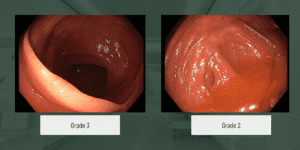A colonoscopy is a vital diagnostic tool used to detect abnormalities and diseases within the large bowel. However, the success and accuracy of this procedure heavily rely on one often overlooked aspect: bowel preparation. Proper bowel preparation is essential to reduce risks, ensure accurate results, and maximise the effectiveness of the colonoscopy. In this blog, we will delve into the importance of excellent bowel preparation and provide essential guidance for patients undergoing this procedure.
Before delving into the specifics of bowel preparation, it’s crucial to understand why it’s necessary. The large bowel must be completely cleansed before a colonoscopy so that our specialists can clearly visualise any abnormalities, such as polyps or inflammation. Inadequate bowel preparation can lead to missed lesions, incomplete examinations, and the need for repeat procedures, causing inconvenience and potential health risks for patients.
Bowel preparation typically begins several days before the scheduled colonoscopy. Patients are advised to adopt a low-fibre diet, avoiding foods such as whole grains, nuts, seeds, dried fruits, and raw fruits and vegetables. This helps reduce the residue in the bowel, making the cleansing process more effective.
As the procedure day approaches, patients are instructed to refrain from consuming solid foods. Instead, they should stick to clear liquids such as broth, tea, apple juice, clear soft drinks, or sports drinks. It’s essential to follow these dietary restrictions strictly to ensure optimal bowel cleansing.
On the day before the colonoscopy, patients will be required to drink plenty of clear fluids to stay hydrated. Additionally, they will need to take a strong laxative prescribed by our specialists to induce bowel movements and empty the bowel completely. This preparation will inevitably cause diarrhoea, so patients are advised to take time off work and stay at home in a comfortable environment with easy access to a toilet. It’s also recommended to have moist wipes and adult nappies on hand to ease any discomfort.
When it comes to fasting, patients should abstain from solid foods for 24 hours before the procedure, consuming only clear liquids up until two hours before the colonoscopy. This ensures that the bowel remains adequately cleansed and facilitates a clear view during the examination.
In addition to dietary and fluid restrictions, patients should also consult with our specialists regarding any medications they are taking. Certain medications, such as blood thinners, iron tablets, aspirin, or anti-arthritis medications, may need to be temporarily discontinued before the colonoscopy to reduce the risk of bleeding or interference with the procedure. It’s crucial to follow the specialist’s instructions regarding medication management closely.
The Boston Bowel Preparation Scale is an indicator specialists use to determine how well the bowel has been prepped for a colonoscopy.

Table: The Boston Bowel Preparation Scale
Examples of a well Grade 2 and 3 prepped colon:

Image: In Grade 3 images, flat polyps are easily detectable, whereas in Grade 2 images, flat or small polyps may be missed.
In conclusion, excellent bowel preparation is paramount for the success of a colonoscopy. By following the prescribed dietary guidelines, staying hydrated, and adhering to medication instructions, patients can ensure a thorough and effective examination of the large bowel. Remember, proper preparation not only reduces risks and enhances the accuracy of results but also contributes to a smoother and more comfortable colonoscopy experience. If you have any questions or concerns about bowel preparation or the colonoscopy procedure, contact our team to assist you further.
Your digestive wellness is within reach.
Experience relief and revitalisation with specialised gastrointestinal care
provided by independent specialists and healthcare professionals.



